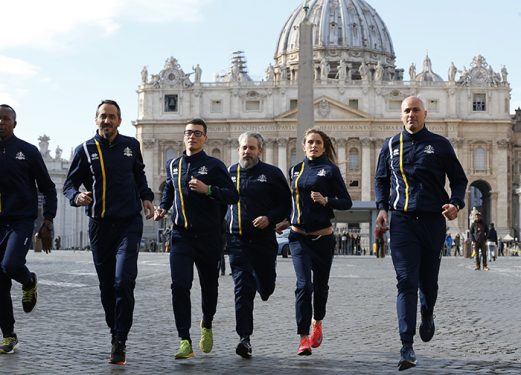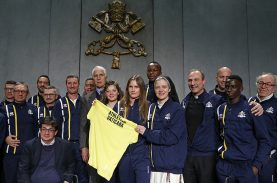
By Inés San Martín, Rome Bureau Chief
ROME (Crux) — What does a librarian in his late 60s, several monsignors, a nun, a survivor of modern-day slavery, and a pharmacist have in common? They are all members of Vatican Athletics, which will be participating in Saturday’s Games of the Small States of Europe.
The games that will be held in San Marino are organized by the national Olympic Committees of nine European small states since 1985.
Spanish Msgr. Melchor Jose Sánchez de Toca y Alameda, head of the Vatican’s sports department in the Council of Culture told Crux that the athletes who will be going have been training several times a week, both on the track and in the gym, explaining that although they don’t have the highest expectations of winning a medal, they’re not going “to make a fool of themselves.”
“The group is clearly amateur, even though some of the youngsters have high potential,” he said. “We are going to compete with dignity, and the preparation of our athletes has been the same as any national team preparing for an international competition.”
There are over 100 people who are formally part of the Vatican’s athletics team, created about two years ago when several employees and citizens of the world’s smallest state literally continued to run into one another on the shore of Rome’s Tiber River or at the magnificent Villa Pamphili.
Membership is free, but being a citizen, an employee, or a child of an employee of the Vatican is a requirement. The only exceptions are two migrants who entered Italy through Lampedusa after fleeing Africa in a rubber boat and a 12-year-old girl in a wheelchair who, in the words of layman Giampaolo Mattei, “truly loves ‘running’ with us.”
Pope Francis welcomed the ten members — the seven athletes participating in the games and their support team — on Saturday.
According to Pope Francis, it’s important that the Vatican has its own sports team because the Church has at heart everything that is human and that concerns the person. And sport is a central dimension in people’s daily lives, so much so that it can be seen as a “sacramental of beauty,” he said.

“It was a very special meeting. In a certain sense, we went to present the project and to ask the Holy Father’s blessing, not to win, but like a son who before leaving home asks for his parents’ blessing,” Msgr. Toca said.
Msgr. Toca said he was particularly thankful for the pontiff’s insistence on the “amateurism” of sport, noting that the vast majority of people who practice sports do it to have fun and to better themselves.
“The key is to enjoy, and this is something that has been lost, even among children, because so much pressure is put on them to be champions that they end up quitting the sport,” Msgr. Toca said. “And this perverse logic of performance and results at all costs turn something that has to be fun into a burden when the fundamental thing should be the joy of practicing sports.”
On Saturday, Pope Francis insisted on the sporting experience as authentic beauty and as a “team mystique,” something both Msgr. Toca and Mattei highlighted when speaking with Crux on Tuesday.
During the audience, the pontiff was presented with a white relay baton with the Latin inscription Simul Currebant – the “motto” of Vatican Athletics, referencing the passage in the Gospel of John when Peter and John “both ran” on the morning of the Resurrection.
Pope Francis autographed the baton which will be handed over at the San Marino Stadium to the representatives of the Small States of Europe. Due to the pandemic, not all 18 small States will be represented.
Mattei, who has worked at the Vatican’s newspaper L’Osservatore Romano for the past 35 years, said the team is very much “in Pope Francis’ style: Humble and promoting a spirit of fraternity.”
“The scope of the team is not to win championships or compete professionally, but to grow as Christians and as persons, giving a witness of Christian life,” Mattei said, giving the example of members saying a short prayer before each competition.
The members of the association range from 19-year-old university students to 60-something librarians, hailing from 20 different countries and taking different roles in the Vatican: Swiss Guards, museum workers, carpenters, and maintenance workers, in addition to clergy and nuns.
This diversity, Mattei said, allows the team members to encounter different cultures, fosters friendship, community, and even interreligious dialogue: One of the two migrants is a Muslim who always takes part in the Masses organized by the team.
“We truly are a family,” he said, acknowledging that as many families, their training sessions sometimes lead to “awe-inspiring snapshots,” such as the Dominican sister running next to a migrant, or a monsignor pushing the young girl in the wheelchair during a race.
The Vatican also fields an unofficial soccer team, a cricket team that has toured the UK on several occasions, and has a cycling and paddle tennis team on the horizon.
Pope Francis himself is a life-long member of the Argentinian soccer club San Lorenzo, though as a fan, not a player. He’s on record saying he was never good at scoring goals, and would often take the position of the goalkeeper when playing with friends in his youth.
